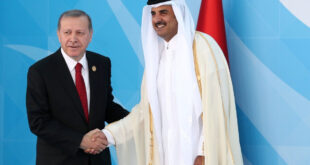
The normalization deal between Israel and the UAE may simply unearth a longstanding covert working relationship, but it could also have important second-order effects.
The Trump administration has taken steps to sell the F-35 Joint Strike Fighter to the UAE, a move which will likely invite pushback from the UAE’s critics in Congress.
The prospect of advanced weaponry going to the UAE has roiled Israeli politics and highlighted Prime Minister Netanyahu’s increasingly centralized decision-making.
Whether other countries will follow the UAE in normalizing ties with Israel absent a deal with the Palestinians remains to be seen despite talk of further breakthroughs.
In the weeks since Israel, the United Arab Emirates, and the United States announced the normalization of Israel-UAE ties on August 13th, questions have arisen about what specific aspects of the longstanding diplomatic status quo in the Middle East will change as a result of the agreement. Given that covert cooperation between Israel and the UAE had taken place for years in the face of the shared threat from Iran, and that Israel and the UAE are not at war in the first place, many have concluded that the agreement is more important symbolically than substantively. Others suggest that it is still unclear whether substance will outweigh symbolism as time goes on. But regardless of the provenance of the agreement and the motivations of its architects, there are reasons to believe that normalization could have real, concrete implications and second-order effects, particularly in U.S. defense exports, Israeli politics, and international relations in the Middle East.
The normalization agreement opens the possibility of the UAE procuring the F-35 Joint Strike Fighter, a prospect formerly closed to the UAE as long as it did not recognize Israel. Longstanding U.S. policy seeks to uphold Israel’s ‘qualitative military edge’ over other countries in the region. In practice, this means that states that do not maintain diplomatic relations with Israel are prevented from importing the most sophisticated weapons that the United States makes available for export. In theory, the agreement removes that hurdle for the UAE, and in fact, the Trump administration has recently pushed to sell the F-35 and advanced drones to Abu Dhabi. But the prospect of such a sale will spur pushback from various quarters, including some in Congress and some in the Israeli government. It could also lead other countries in the region to aggressively seek similar, sophisticated weaponry, touching off an arms race. In recent years, the UAE has taken an active role in regional conflicts, including in Libya and Yemen, where the Saudi-led coalition fighting Iran-backed Houthi rebels has killed many civilians, earning the UAE some high-profile critics in the U.S. Congress. The deal could pit pro-Israel advocates against the defense lobby in the battle for influence in Congress, an unusual situation given the depth of the U.S.-Israel defense partnership.
From the Israeli side, it is inconceivable that Prime Minister Benjamin Netanyahu agreed to normalization without considering the likelihood that the UAE would eventually obtain advanced American weaponry as a result. But as the picture of the Israeli reaction to the deal becomes clearer, it now appears that fissures are opening between Netanyahu and the Mossad on the one hand, and Israel’s defense establishment and some of Netanyahu’s coalition partners on the other, specifically regarding potential weapons sales to the UAE. Strikingly, Netanyahu kept Defense Minister Benny Gantz and Foreign Minister Gabi Ashkenazi in the dark over the normalization deal until shortly before it was announced. In the weeks since the announcement, Gantz has publicly stated that the UAE’s acquisition of the F-35 is ‘not good’ for Israel. The controversy has highlighted Netanyahu’s increasingly centralized decision-making and raised questions in Israel over the policy process involved in making key national security decisions.
The deal has the potential to affect diplomacy and international relations in the broader Middle East, even if only to further reify working relationships that, until recently, have taken place behind closed doors—though no subsequent breakthrough appears imminent just yet. Since the deal was announced, sometimes contradictory reports of advances in talks between Israel and Sudan, Oman, Bahrain, and Morocco have surfaced. However, leaders from several of these countries have dismissed the prospect of normalizing ties with Israel in the absence of a deal with the Palestinians. Notably, Sudan’s acting Foreign Minister fired a Foreign Ministry spokesman who indicated that Khartoum was preparing to sign an agreement normalizing ties with Israel, suggesting that normalization is a long way off. For its part, the Palestinian Authority has rejected the UAE’s decision to normalize, and Hamas has joined in criticizing the deal, highlighting relatively rare unity among the different Palestinian factions on the issue. And none of these countries is as active in regional military affairs as the UAE, diminishing the incentive power of the prospect of acquiring advanced weaponry in exchange for normalization. Rumors of more breakthroughs should be treated as such—just rumors.
 Eurasia Press & News
Eurasia Press & News



